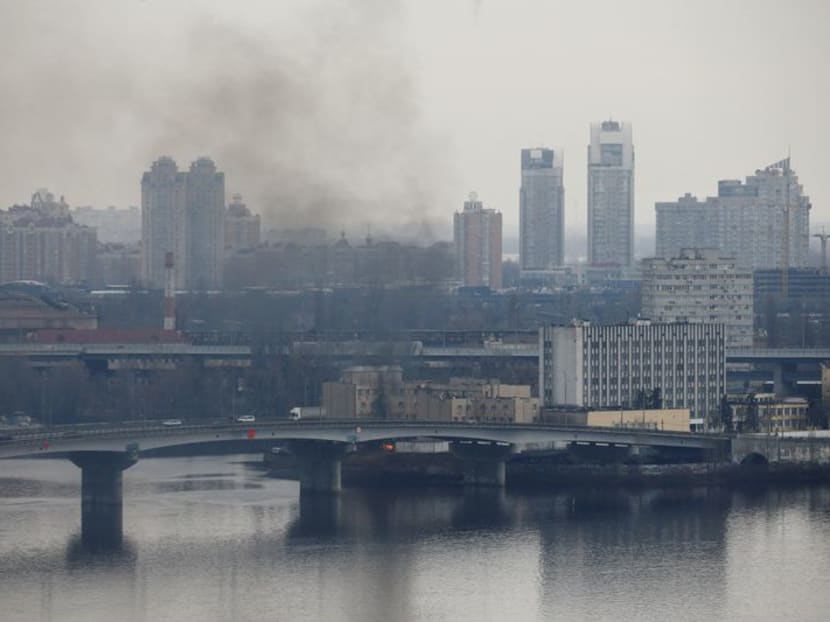Explainer: Why has Putin's Russia invaded Ukraine?

Smoke rises from the territory of the Ukrainian Defence Ministry's unit, after Russian President Vladimir Putin authorized a military operation in eastern Ukraine, in Kyiv, Ukraine February 24, 2022. REUTERS/Valentyn Ogirenko
War returned to Europe on Thursday (Feb 24) with Russia carrying out a "full-scale" invasion of Ukraine after having troops amassed at the border for weeks.
Russian President Vladimir Putin said in an address to the nation that he had ordered a "special military operation" to protect people, including Russian citizens, subjected to "genocide" in Ukraine.
He added his aim was to demilitarise and "denazify" Ukraine. He said any hindrance would be met by "such consequences that you have never encountered in your history".
Ukrainian President Volodymyr Zelenskyy, who is Jewish, compared Russia's invasion of his country to military campaigns carried out by Nazi Germany during World War II.
"Russia has attacked Ukraine in a cowardly and suicidal way, like Nazi Germany did during World War II," he said.
Here are some of the reasons why Putin is so preoccupied with Ukraine and why he has chosen to bring the crisis to a head now.
RUSSIA VS THE WEST
Since the Cold War ended, NATO has expanded eastwards by taking in 14 new countries, including the states of the former Warsaw Pact and the three Baltic nations that were once in the Soviet Union.
Russia saw this as a threatening encroachment towards its borders and continues to say it was a betrayal of Western promises at the start of the 1990s - something the United States and its allies deny.
"It is a fact that over the past 30 years we have been patiently trying to come to an agreement with the leading NATO countries regarding the principles of equal and indivisible security in Europe," Putin said in his address on Thursday.
"In response to our proposals, we invariably faced either cynical deception and lies or attempts at pressure and blackmail, while NATO continued to expand despite our protests and concerns. Its military machine is moving and, as I said, is approaching our very border."
Putin has previously said that Ukraine's growing ties with the alliance could make it a launchpad for NATO missiles targeted at Russia. He said Russia needs to lay down "red lines" to prevent that.
Ukraine is not a NATO member but has a promise dating from 2008 that it will eventually get to join. Since toppling a pro-Russian president in 2014, it has become closer politically to the West, staged joint military exercises with NATO and taken delivery of weapons including US Javelin anti-tank missiles and Turkish drones.
Kyiv and Washington see these as legitimate moves to bolster Ukraine's defence after Russia seized the Crimea region in 2014 and provided backing to separatists who are still fighting government forces in eastern Ukraine.
PUTIN'S MINDSET AND MOTIVES
Analysts have said that using NATO as an excuse, or pre-text, to invade Ukraine is merely a ruse by Putin.
With the 1991 break-up of the Soviet Union, Russia lost control of 14 former republics it had previously dominated, but the loss of Ukraine was the most painful.
The two had been linked since the 9th century when Kyiv became the capital of the ancient state of Rus; in 988 its ruler, Grand Prince Vladimir, introduced Orthodox Christianity. From 1654, Russia and Ukraine were united by treaty under the rule of the Russian tsar.
The two countries speak closely related languages and later formed, with Belarus, the Slav core of the Soviet Union. Many Russians feel a connection with Ukraine that they do not feel with other former Soviet republics in the Baltics, Caucasus and Central Asia.
Putin alluded to this in a long essay in June 2021 in which he said Russians and Ukrainians were one people who shared a single "historic and spiritual space" and that the emergence of a "wall" between them in recent years was tragic. Kyiv rejected his argument as a politically motivated and over-simplified version of history.
Related:
Putin, who once called the break-up of the Soviet Union the greatest geopolitical catastrophe of the last century, has devoted his presidency to restoring Moscow's influence throughout the post-Soviet space, defying the West and trying to reassert Russia as a global power.
"In the late 1980s, the Soviet Union grew weaker and subsequently broke apart," he said in his speech on Thursday.
"That experience should serve as a good lesson for us, because it has shown us that the paralysis of power and will is the first step towards complete degradation and oblivion. We lost confidence for only one moment, but it was enough to disrupt the balance of forces in the world."
After 22 years as Russia's paramount leader, some analysts believe Putin may be pondering his own legacy and looking to complete unfinished business in Ukraine by blocking its westward shift and reclaiming it as part of a Russian sphere of influence - something that Ukraine, NATO and the United States all said they will never accept.
GEOGRAPHY AND RESOURCES
Ukraine is the second biggest country in Europe after Russia itself, has major ports on the Black Sea and shares borders with four NATO countries. It is a major exporter of corn and wheat.
Europe depends on Russia for about one third of its natural gas - providing leverage for Putin in any dispute with the West - and one of the main pipelines passes through Ukraine.
Controlling the Ukrainian territory that it crosses would enhance Russia's pipeline security and protect its ability to "weaponise" energy supplies. Most analysts, though, consider it unlikely that Russia would attempt to seize and defend large swathes of Ukrainian territory because the military cost would be too high.




